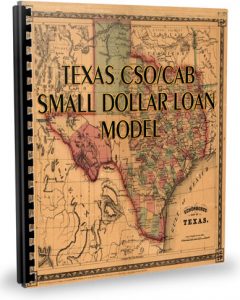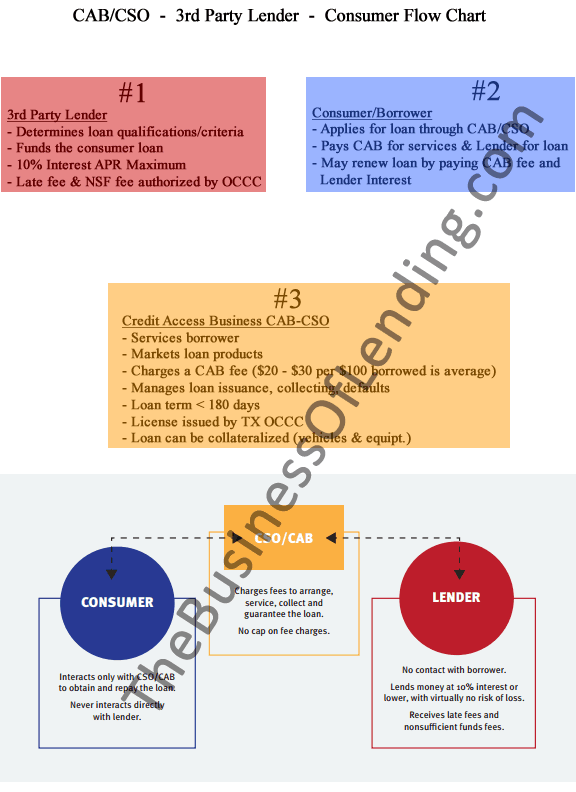Why Use the Texas CAB/CSO Model to Lend Money to the Masses?
In the old n’ times lenders funding payday loans – nowadays often referred to as installment loan lenders – in states not having specific payday loan “safe-harbor” legislation, lenders like Curo, Enova, Elevate, would partner with a state-chartered FDIC insured bank (Bank of Delaware is one example) in order to charge payday loan borrowers more than the maximum state usury rates allowed.
This was the case in Texas, Arkansas, Pennsylvania, New Jersey… The payday loan company acted as a “marketer, a servicer and a processor for the bank. This loan model is referred to as the “bank-model.” The “bank-model” was extremely popular for years and resulted in substantial profits for the companies utilizing it.
As an example, a dated study by the Texas Consumer Credit Commissioner estimated 1.81 million loans were made in Texas using the “bank-model.” $626 million dollars were loaned. The average loan was $338 with an average APR of 511%.
The Federal Deposit Insurance Corporation’s Revised Guidelines for Payday Lending, which took effect way back in July of 2005, adversely impacted those payday loan lenders using this “bank model” to export usury rates across state lines. This edict forbids banks from providing payday loans to people who have had an outstanding payday loan from any lender for more than 3 months in the previous year. The Revised Guidance limits the frequency of customer usage of payday loans and limits the period a consumer may have a payday loan outstanding from any lender to an aggregate of three months during the previous 12 month period. Based on an average term of 15 days, this effectively limits the number of payday loans that may be made to any consumer to six during any 12 month period. All payday loans made from any payday lender would count against this limit.
So in the state of Texas, and Ohio and a few others, the cunning payday loan operators conceived of employing the “Texas Credit Services Organization (CSO) / Texas Credit Access Business (CAB)” loan model.
By implementing this CSO Model, we payday loan/installment loan lenders can service the continuing, unabated consumer demand for our loan products while remaining profitable enough to earn a fair return on our investments, pay our employees a fair wage, pay our taxes and support our communities.
The bottom-line is demand for the payday loan/installment loan product has been clearly established. The CAB/CSO model is on a firm foundation with specific case law to support it; it has already survived a federal court case. Additionally, the CAB/CSO model can yield higher transaction fees and margins than the bank model or, as in the state of Texas, the “Regulated Lender” licensing model.
The multi-million dollar payday loan companies have spent millions of dollars in legal fees to research and refine the CSO/CAB model; follow their example.
Texas: Do you know just enough to be dangerous? Do you need an in-depth understanding of how the Texas CAB/CSO consumer loan model works? Are you wondering how the 3rd Party Lender fits into all this? Why it appears you must pay to lend your own money? How do you get licensed to offer loans in Texas? Do you need a 3rd Party Lender?
We’ve got you covered! Our newest Training Manual is our 88 page:
“Texas CSO/CAB Model & Analysis: the Credit Services Organization Ver. 10.0.”
Table of Contents
What is a CAB/CSO
How a CAB/CSO Works
Nuts & Bolts of 3rd Party Lender
Key CAB/CSO Characteristics
Why Use the CAB/CSO Model
Pros & Cons Regarding the CSO Model
Strategies for implementing the CAB/CSO Model
CSO/CAB Software Solutions
Advance America & the CSO Model
Payday Lenders Strike Back
Key Legal Authority
Typical CSO Documentation
Resources
A Typical Consumer Loan Agreement
Introduction
Key Characteristics
Key references
Basic Program Documents and Materials
10% loans under Texas Finance Code Chapter 302
Texas Credit Services Organization Act (Tex. Fin. Code Chapter 393)
79th Texas Legislature, Regular Session
Texas Finance Commission Review
Texas Attorney General Review
Other Background Information
Developments in Other States
CREDIT SERVICES ORGANIZATION: TYPICAL AGREEMENT
TEXAS FINANCE CODE
Lovick versus RiteMoney LTD
You can get a PDF copy now! Immediate download available.




